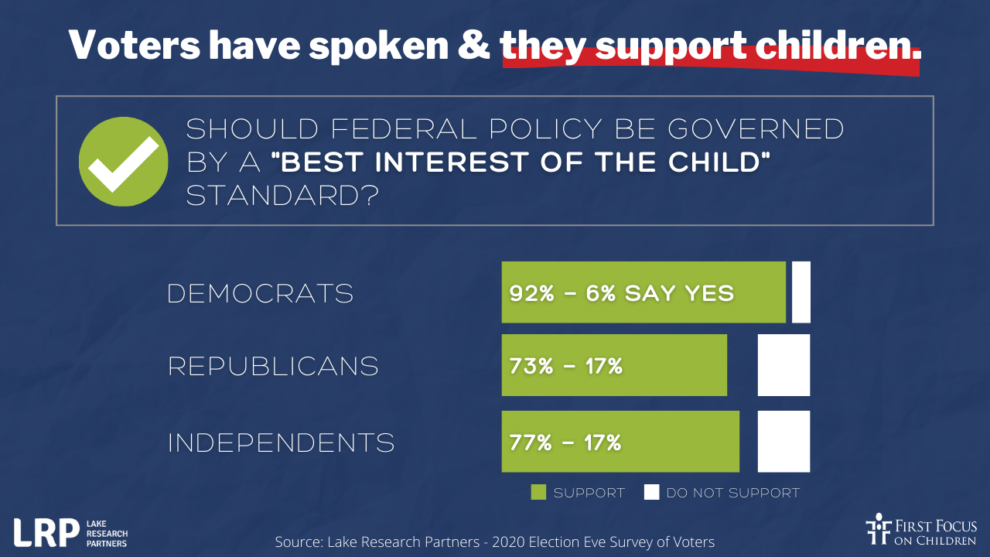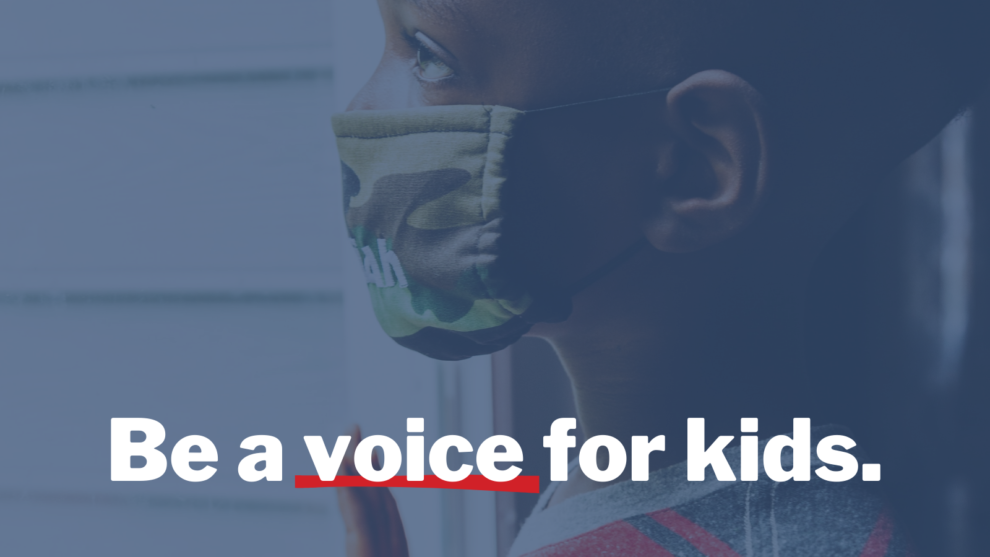Our children are not alright. The pandemic and economic recession have affected every aspect of children’s lives. They need our full attention and protection more than ever. Children desperately need to be in school for their education, mental health, overall well-being, and to see their friends, but that needs to be done safely.
Unfortunately, from the very beginning of the global pandemic and economic recession, children and their families had to overcome the myth that children were “almost immune” and largely unaffected by COVID-19. Such claims have always been wrong.
Again, we know that every aspect of the lives of children has been negatively impacted by the COVID pandemic and economic recession, including the health of kids.
The lives and well-being of children have been disrupted in numerous ways, including the closure of schools and child care centers, rising pediatric mental health-related emergency room visits, increasing rates of child poverty, child hunger, and child homelessness, and deaths to an estimated 1.5 million caregivers of children across the world.
Earlier this year, Congress passed and President Joe Biden signed into law the American Rescue Plan Act, which addressed some of the problems facing kids on a temporary one-year basis.
For example, the Child Tax Credit was improved to make the credits fully refundable (thereby cutting child poverty by nearly 50 percent) and increased the amount of the credits to families to $3,600 per child that is 6 years of age and under and to $3,000 for each child 6–18 years of age.

As part of the President’s American Family Plan, Congress and the President are working on preventing these Child Tax Credit improvements from expiring and having child poverty double. The bill also addresses other important issues like early childhood, child care, family medical leave, child hunger, etc.

These improvements are all critically important for children.
However, the growing threat of COVID-19 to the health of children is an urgent problem that needs greater attention and focused policy solutions.
The myth that “kids are fine” continues to be hard to shake, but kids are contracting COVID-19 and being hospitalized, and dying at higher rates.
For children, there are also the longer-term consequences of long-haul COVID-19 and MIS-C, which is a delayed heart inflammation or toxic shock response to the virus in some kids.
If children are going to return to school safely, educators and public health officials need to be able to take measures they deem necessary to best protect both teachers and the children they are entrusted to educate and protect. Doing nothing is not an option for success.
Fortunately, many schools are taking steps in consultation with experts at the American Academy of Pediatrics (AAP) and the Centers for Disease Control and Prevention (CDC), which have recommended that adults and teenagers get vaccinated and that schools utilize other public health measures like masks, screening testing, improved ventilation, hand washing, and social spacing to protect students and educators alike.
At First Focus on Children, we have argued that there should be a focused plan on getting young people vaccinated and get them back to school safely. As we wrote back in April 2021:
As states begin to loosen their COVID-19 restrictions and protections, more adults get vaccinated, and more social activities begin to return to pre-COVID-19 practices, unvaccinated children will be increasingly at risk. The administration must do everything in its power to foster the testing and distribution of safe and effective vaccines for children against COVID-19. Children have carried more burden over the last year during the COVID-19 epidemic than they should ever be asked to. We owe it to our children to protect them from this virus as quickly and effectively as possible, and we must plan now how to give them access to a vaccine once one has been approved for them.
A comprehensive plan would still be beneficial because the health care needs of children are different than those of adults. Such an agenda would hopefully include approval by the Food and Drug Administration (FDA) of a COVID-19 vaccine for kids 12 years of age and under.
More adults should also get vaccinated.
However, until we are able to get a much higher share of adults and children vaccinated, schools must continue to work to implement the array of public health measures to protect children from COVID and keep schools from having to resort to lockdowns and quarantines, which everybody should agree is something we should avoid as best as possible.
Therefore, it is deeply troubling that governors and other elected officials, who focused much of 2020 on creating protections for senior citizens and people with disabilities in nursing homes are suddenly arguing against such protections and public health measures when it comes to protecting children.
Adults, including parents, strongly support schools implementing public health measures to protect children. For example, a recent pollcommissioned by Florida Politics found that, by a wide 2-to-1 margin, Floridians strongly support mask mandates in schools.

Children desperately need a return to sanity, science, and rational respect and discourse in our country. Adults should prioritize the “best interests” of children when making policies that impact the lives of children.
This may seem like common sense. By an 81–13 percent margin, Americans support federal policy being “governed by a best interest of the child” standard.

As Drs. Michelle Fiscus and Jason Yaun point out, it is time for political leaders to do the right things for children and to be accountable for ensuring that the best interests of children are addressed.
Unfortunately, doing the right things for kids happens far less frequently than it should.
In this case, advocating against both vaccines and masks is not a policy in the best interest of children. It is a complete abdication of adult responsibility and leaves children completely unprotected. Doing “nothing” might not be malicious, but it is not neutral. It fails children by knowingly leaving children in harm’s way.
Far too often, elected officials choose to play politics with children. They sometimes treat children as mere pawns in a political game of catering to anti-science misinformation, anti-vax Facebook groups, and public school privatizers.
In the case of Gov. DeSantis, he seems to be operating under the mantra to never let “a serious crisis go to waste.” Just this past week, he used the COVID-19 pandemic as an opportunity to pass emergency rules to further his long-standing goal of privatizing Florida’s public schools.
Efforts by governors or state legislators to either prohibit public health protections from being adopted by schools or implementing various forms of financing penalties to block such efforts puts the health of children at greater risk. As for school vouchers in Florida, taxpayers will be funding schools like Centner Academy, a private school in Miami, that has been at the epicenter of the lie that the COVID-19 vaccine threatens fertility.
Fortunately, in order to protect children from the harmful decisions by some governors, a number of parents and school districts are looking at options to sue or openly defy governors in order to affirmatively protect the health and safety of children.
In a piece of good news, last week a judge in Arkansas issued a preliminary injunction against the State’s ban on school mask mandates.
Protecting children and addressing their best interests should not be political or partisan. In fact, it is simply common sense. As Dr. Scott Gottlieb, former head of the Food and Drug Administration (FDA) during the Trump Administration, said this weekend on Face the Nation:
I can’t think of a business right now that would put 30 unvaccinated people in a confined space without masks and keep them there for the whole day. No business would do that responsibly, and yet that’s what we’re going to be doing in some schools.
In fact, it would be helpful and less hypocritical if state officials would protect children in similar ways to how they are protecting themselves and other state employees.
And, as Dr. Ali Khan correctly points out, even when the issue is supposed to be about children, their concerns and needs are often not given the attention they demand. Sadly, the focus is often about everybody else’s opinions, but not those of kids.
Children have, as Georgia’s Fulton County Schools recognize, a fundamental right to weigh in on matters that impact their lives and to advocate for their own education, health, and nutrition. Some have argued it is sad that they have to speak out on political issues that impact their lives, but I strongly disagree.
In fact, it is critical that we encourage it and to lean in and hear their concerns and needs. We should be carefully listening to them and consider the affirmative roles that they can play in protecting themselves, their fellow students, their families, and their communities from COVID-19.
We also need more responsible adults to step up and speak out on behalf of the best interests of children. On a bipartisan basis, some are doing so.
Thanks to Dan Rather for focusing attention on the health of children.
Thanks to Anna Navarro-Cárdenas for putting children and medical science front and center.
And thanks to White House Press Secretary Jen Psaki for speaking out as both a parent and a policymaker.
There are also voices speaking up for kids against the odds, such as Ali Noland in Little Rock, Arkansas.
However, we need more voices for children and are asking you to join a growing movement to be an Ambassador for Children.
Children do not vote. They do not have Political Action Committees (PACs). And they do not employ lobbyists to demand that politicians act in their best interests.
As an Ambassador for Children, you would be a voice to help advocate for improving the lives and well-being of our nation’s children to cut child poverty, ensure all children have health coverage, reduce child hunger and homelessness, protect children from abuse, neglect, and child trafficking, and expand early childhood and high-quality child care options.
Another option is to donate to the work of First Focus on Children in our effort to educate lawmakers, the media, and the public about the needs and concerns of children and families both in the U.S. and abroad. Your contributions will help ensure that children are no longer ignored or treated like political pawns.
Kids are not alright and they need our voices and advocacy now — more than ever.

